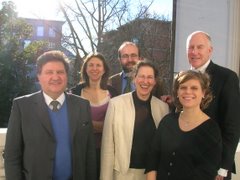I came across this article recently published by The Economist: http://www.economist.com/node/21527025 which is on game theory. It explains how game theory may be used (and how it is used) to predict human beings' behaviour in a variety of fields. Politics and negotiation are just a couple of good examples. The journalist even reports that game theory would have played a role in finding Bin Laden's hiding place last May.
Well, so far so good. The fact is, I knew about game theory because when I was working on my PhD on dispute mediation I learnt that this branch of mathematics is used in negotiation. I did not really use it for my own research; my feeling was that the emphasis on a mathematical model was hardly conciliable with my own focus on argumentation - and how argumentation can indeed change the power balance, change the individuals' priorities by helping them find out their real interests. So I sort of abandoned game theory halfway through my PhD journey.
However, who knows... In The Economist's paper, I found it particularly interesting that a game-theory based consultation may cost you a lot of money because you "must first conduct lengthy interviews with experts" to construct a reliable model. Perhaps investigating this aspect - what these "lengthy interviews" amount to and how they are used - would allow integrating game theory in an argumentation-focused study of argumentation and mediation.
Monday, 12 September 2011
Friday, 17 June 2011
A story about the argumentative attitude
"In addition to the rules and the arguments, the Talmud also contains stories. One famous story from the Tractate Baba Metzia (59b) shows that the sages knew full well the importance of earthly dispute for discovering the divinely correct rules of conduct. The sages were discussing whether or not a particular oven infringed the rules of ritual cleanliness. Surprisingly on this occasion the opinion of the great Rabbi Eliezer was rejected. Rabbi Eliezer, convinced of the correctness of his view, decided to enlist the help of the Almighty to prove his point. He declared: "Let this carob-tree prove that things are as I state". Whereupon the carobs were miraculously thrown a great distance off the tree. The other rabbis remained unimpressed and merely replied: "The carobs prove nothing". Rabbi Eliezer then said: "Let the walls of the college then prove I am right". The walls of the building, in which they were all gathered, began to shake and totter. The other rabbis shouted angrily to the walls: "If scholars are discussing the Law, what right have you to interfere!". The walls stopped their shaking. Finally, in desperation Rabbi Eliezer called out: "Let it be announced in the heavens that my statement was correct". And a heavenly voice was heard by all to say: "Why do you quarrel with Rabbi Eliezer, who is always right in his decisions?" That was not the end of the matter. Rabbi Joshua answered the heavenly voice back by quoting from the Bible: "The Law is not in the heavens". The Law, indeed all laws, lay now in earthly discussions. If heavenly voices wished to join in the debates, then they must do better than to shake walls or send carobs flying: they must present good arguments. Even a heavenly voice would have to conform to the dictum that "a legal decision depends not on the teacher's age, but on the force of his argument" (Talmud, Baba Bathra, 142b).
[From M. Billig, Arguing and Thinking: A Rhetorical Approach to Social Psychology, Cambridge University Press, 1996.]
[From M. Billig, Arguing and Thinking: A Rhetorical Approach to Social Psychology, Cambridge University Press, 1996.]
Friday, 11 March 2011
Argumentation in dispute mediation: OUT TODAY
My book Argumentation in dispute mediation is out today!
hurry up before it is sold out :-)
Thursday, 17 February 2011
ARGUMENTATION IN DISPUTE MEDIATION
Yes, yes, my book about dispute mediation is coming soon. We expect it for early march. See the endorsements I have received on the John Benjamins website:
“Sara Greco-Morasso is a prominent member of a group of young scholars that are spearheading research into the role of argumentation in a variety of concrete social, cultural and professional contexts and practices. Her book on the role of argumentation in mediation shines for theoretical finesse and for attention to detail in examining real practices and authentic conversational data. The palette of theoretical and methodological tools put to good use in the book is impressive, and most notably includes the use of lexical semantics in the clarification of key domain terms (like conflict) and the application of loci (topics) to the analysis of the inferential configurations of the arguments used by mediators.
With this sensitive and well informed book, argumentation quietly reclaims a domain that is naturally its own: the use of reason in dialogue to restore jeopardized relationships.”
Andrea Rocci, Università Della Svizzera Italiana (USI)
“A specific strength of this brilliant work is the very refined analysis of conflicts in their argumentative but also human, emotional as well as cognitive dimensions. In the actual practice of conflict resolution, these elements mutually scaffold each other for better or for worse. The reader will find a very detailed account of how the process of argumentation is co-constructed in the context of dispute mediation. In other words, this book re-reads the tenets of conflict resolution from a communicative viewpoint, showing how the fundamental principles of mediation are realized by means of the mediator’s contribution to the parties’ argumentative discussion. The consideration of the disputants' interests (guaranteed by the mediator) builds the necessary trust for them to shift from conflict to cooperation and opens the way to enter into a sound argumentative process. The mediator's argumentative awareness is a key-element in this respect: it enhances the possibility to reframe the problem and helps the parties build a creative solution to their problem. This very well informed book will fascinate all those who are interested in understanding argumentation and conflict mediation in context.”
Anne-Nelly Perret-Clermont, University of Neuchâtel
“Sara Greco-Morasso is a prominent member of a group of young scholars that are spearheading research into the role of argumentation in a variety of concrete social, cultural and professional contexts and practices. Her book on the role of argumentation in mediation shines for theoretical finesse and for attention to detail in examining real practices and authentic conversational data. The palette of theoretical and methodological tools put to good use in the book is impressive, and most notably includes the use of lexical semantics in the clarification of key domain terms (like conflict) and the application of loci (topics) to the analysis of the inferential configurations of the arguments used by mediators.
With this sensitive and well informed book, argumentation quietly reclaims a domain that is naturally its own: the use of reason in dialogue to restore jeopardized relationships.”
Andrea Rocci, Università Della Svizzera Italiana (USI)
“A specific strength of this brilliant work is the very refined analysis of conflicts in their argumentative but also human, emotional as well as cognitive dimensions. In the actual practice of conflict resolution, these elements mutually scaffold each other for better or for worse. The reader will find a very detailed account of how the process of argumentation is co-constructed in the context of dispute mediation. In other words, this book re-reads the tenets of conflict resolution from a communicative viewpoint, showing how the fundamental principles of mediation are realized by means of the mediator’s contribution to the parties’ argumentative discussion. The consideration of the disputants' interests (guaranteed by the mediator) builds the necessary trust for them to shift from conflict to cooperation and opens the way to enter into a sound argumentative process. The mediator's argumentative awareness is a key-element in this respect: it enhances the possibility to reframe the problem and helps the parties build a creative solution to their problem. This very well informed book will fascinate all those who are interested in understanding argumentation and conflict mediation in context.”
Anne-Nelly Perret-Clermont, University of Neuchâtel
Thursday, 2 December 2010
EXPECTED SOOON: "ARGUMENTATION IN DISPUTE MEDIATION"
My book on Argumentation in dispute mediation is "expected soon" and already present on the John Benjamins webiste:
Please have a look and expect some really interesting reading for 2011!!! :-)
Subscribe to:
Posts (Atom)


